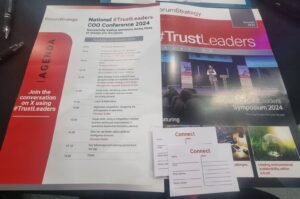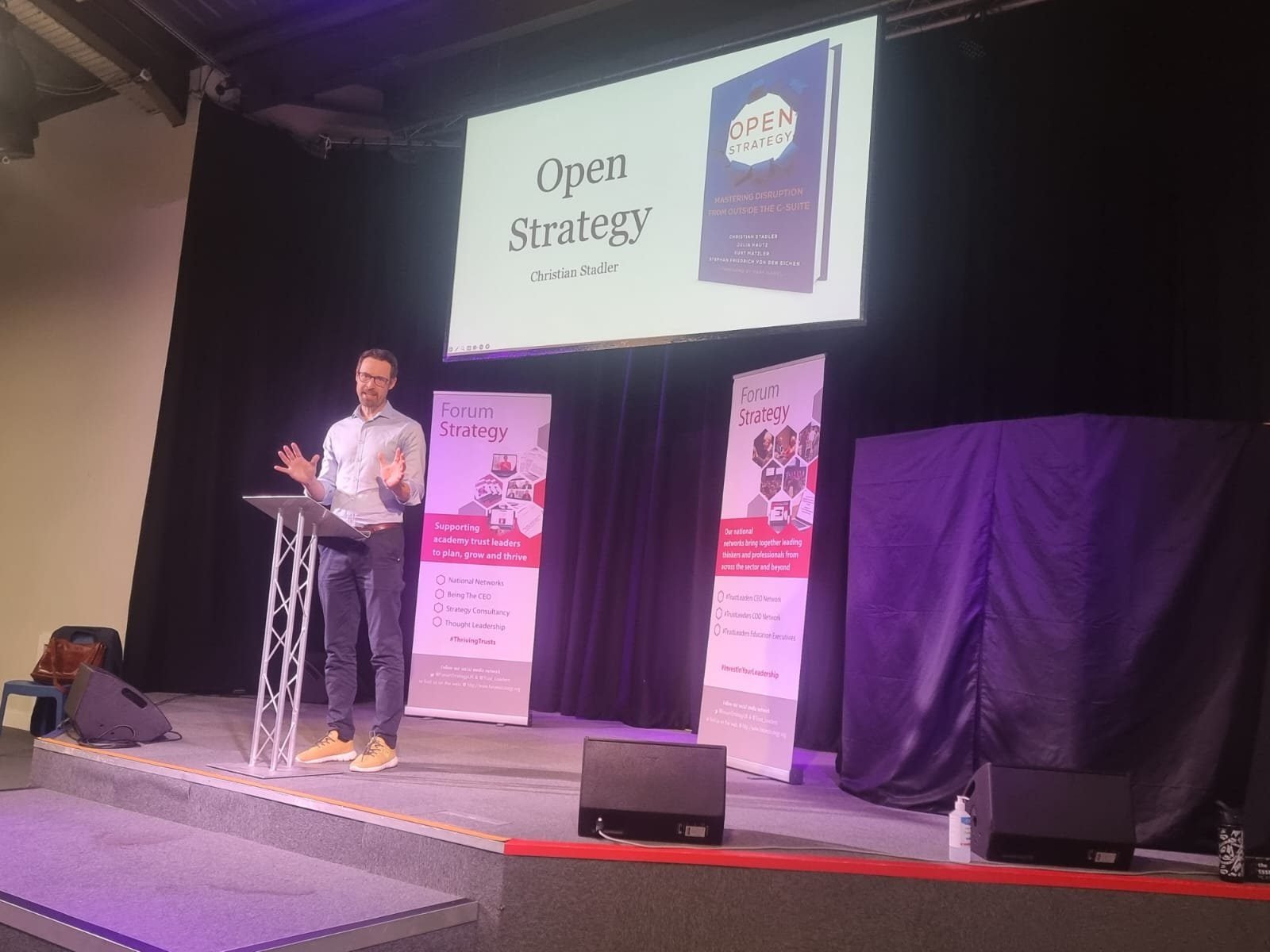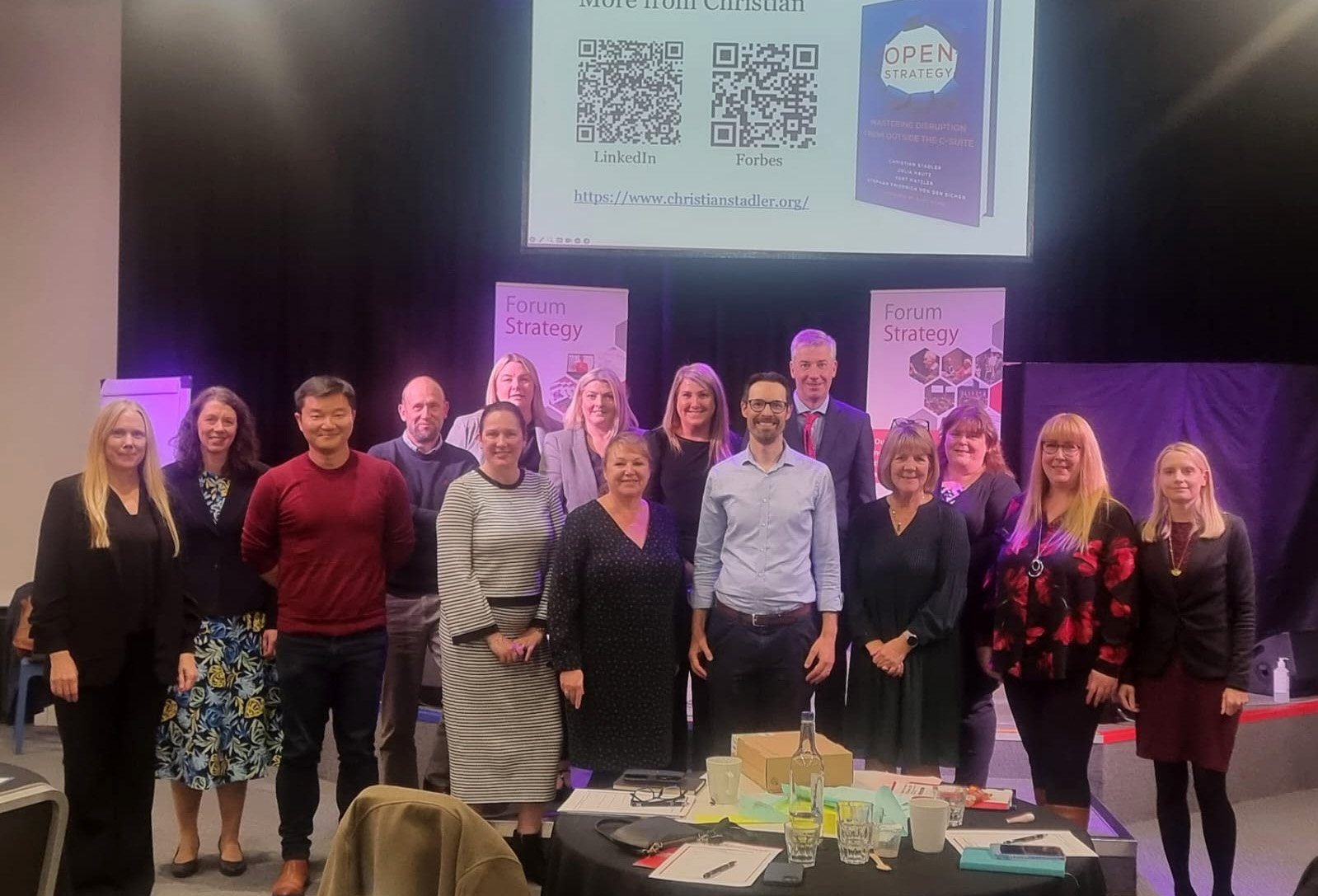 On Thursday 3 October, members of our National #TrustLeaders COO Network came together for the National #TrustLeaders COO Conference 2024, in Nottingham to consider what effective operations leadership looks like during changing and challenging times. The day explored key areas of strategic leadership that are important to the success of a thriving trust and outlined areas that will likely experience change and evolution over the months and years ahead.
On Thursday 3 October, members of our National #TrustLeaders COO Network came together for the National #TrustLeaders COO Conference 2024, in Nottingham to consider what effective operations leadership looks like during changing and challenging times. The day explored key areas of strategic leadership that are important to the success of a thriving trust and outlined areas that will likely experience change and evolution over the months and years ahead.
Setting the Context
Alice Gregson opened the day by addressing the evolving role of COOs in the current educational landscape. She referenced the recent National #TrustLeaders CEO Network theme, “Leading with Contextual Wisdom,” emphasising that effective leadership combines contextual awareness, discipline, and intentionality. Alice stressed the importance of strategic thinking, urging COOs to move beyond “putting out fires” to anticipating and preventing them—an approach that distinguishes good COOs from great COOs. This strategic mindset, she explained, would be a key focus of the conference, encouraging COOs to think proactively and to consider ways in which they might future-proof their organisations, in partnership with their CEOs and others.
“Alice stressed the importance of strategic thinking, urging COOs to move beyond “putting out fires” to anticipating and preventing them—an approach that distinguishes good COOs from great COOs.”
She then reflected on the broader national context, highlighting ongoing challenges such as the lingering effects of COVID-19 on mental health, attendance and behaviour; as well as the impact of the ongoing cost pressures crisis, community tensions, and new government policies. Alice also discussed the opportunities and risks associated with AI and technology, along with the growing demand for environmental sustainability, driven by young people seeking role models and significant shifts in societal values and focus. In addition, Alice touched on the shifting expectations of the workforce, where flexibility, purpose, manageable workload, and a positive workplace culture are becoming key priorities. She emphasised that schools and trusts must adapt to these changes to sustain success by retaining and recruiting the very best staff to serve pupils. As the national context evolves, so too does the role of the COO, aligning more closely with that of the CEO to address these challenges. This, she emphasised, is why intentionally making time to step back to reflect is so important.
Finally, Alice highlighted the sense of isolation often experienced by COOs and explained how the Forum Strategy’s COO Network serves as a valuable platform for discussing priorities and challenging COOs to operate in the strategic space and encouraged members to make the most of the connections on offer.

What is Strategy?
Alice then introduced Christian Stadler, author of Open Strategy: Mastering Disruption from Outside the C-Suite, explaining that the day ahead was intended to create different conversations and ways of thinking about strategy and the COOs role within this. She acknowledged that COOs and operations leaders are very often really well connected in their roles (given their operational oversight), making them perfect for supporting the ‘open strategy’ approach, championed by Christian.
Christian, began with outlining how his work focuses on helping organisations from across the globe to craft strategies and think through strategic challenges in order to achieve continuous improvement and maintain success. He began by exploring the fundamentals of good strategy, identifying three key elements.
Firstly, good strategy is about being unique—doing something that no one else is doing. This can be achieved by either doing something no one else does or by doing something no one else can do. Strategy identifies and outlines what only your organisation can be best at.
“good strategy requires extreme focus. A long list of goals and priorities dilutes attention and effort”
Secondly, good strategy requires extreme focus. A long list of goals and priorities dilutes attention and effort. Christian advised narrowing focus by evaluating challenges based on their importance and how easily they can be addressed. This helps to prioritise what truly matters.
Thirdly, good strategy answers three essential questions: Where are we today? Where do we want to go? And how do we get there? These questions, Christian explained, provide the foundation for building a clear and effective strategic direction. Creating an effective strategy, according to Christian, takes four steps;
- Understand the environment
- Understand the resources
- Identify priorities
- Set strategic direction
What Is Wrong With The Way We Make Strategy Now
Christian next addressed the common pitfalls in traditional strategy-making. Typically, strategy is developed by the CEO and a small executive team, which can lead to several limitations. One issue is isomorphism—where the leadership team all start to think in the same way, reducing diversity of thought. Small groups are also prone to big biases, making it difficult for those with differing ideas to speak up. Christian pointed out the danger (and commonality) of silo thinking, where different departments, despite having the same goals, fail to communicate openly with one another. This lack of coordination can result in inefficiencies and duplication of efforts. Another key issue is the disconnect between leadership and the front line. When those at the top do not engage with the front-line staff, they risk missing critical insights and overlooking important challenges. Christian emphasised that for strategy to succeed, everyone in the organisation must feel heard and understood, ensuring that real issues are addressed and not misunderstood or ignored.
“Small groups are also prone to big biases, making it difficult for those with differing ideas to speak up.”
Open Strategy
At this point, Christian introduced the concept of Open Strategy, which involves broadening participation in the strategy-making process beyond just the management team. He encouraged the COOs to find ways to involve people from across the organisation in shaping the strategic direction. Christian highlighted a significant issue in many organisations: only 13% of frontline employees can correctly identify three strategic priorities in their organisations. Open Strategy aims to engage as many people as possible in developing strategic ideas. Psychologically, he explained, when employees are included in the strategic process, they not only become more committed to the organisation’s goals but also bring a wider diversity of ideas, enriching the strategy.
Christian then outlined a simple and effective method for opening up strategy-making: creating a trend radar. A trend radar helps gather input from across the organisation by asking employees what trends or issues are important to them. The process of building a trend radar involves four steps:
- Run a survey to define the scope of inquiry.
- Identify possible trends by gathering input from participants.
- Select and evaluate core trends to assess organisational preparedness.
- Construct a trend radar visual to display and communicate the key trends.
This tool provides a structured way to engage staff in strategic thinking while ensuring that the organisation’s priorities remain aligned with its evolving needs and challenges.
As an example of defining the scope in practice, conference delegates were asked to identify key trends in education. Dozens of trends were identified but Christian was quick to identify that these dozens of trends could be synthesized into headings which would encompass them all. The main trend headings for education became:
- Digital transformation;
- Economy;
- Shifts in social values;
- Competition vs cooperation;
- Government regulation
In the afternoon, Christian introduced the idea of imagining ‘nightmare competitors’ or on the flip side, exploring ‘untapped potential’ to help to drive continuous improvement in organisations. Explaining that once key trends (and priorities) have been identified, organisations must then consider how to innovate in order to address them. This can be done by imagining you have a competitor organisation who wants to encroach on what you do (so you need to innovate to guard against this) or, imagining areas of untapped potential that could help to unlock solutions to address disruptive trends. The conference group chose to focus on the latter, more positive way of exploring this.
“Open Strategy aims to engage as many people as possible in developing strategic ideas.”
Delegates then engaged in practical activities. Working in groups, they brainstormed potential game-changing ideas for the educational landscape. Each delegate then created a “pitch” for their idea, and the groups selected one idea to present to the rest of the conference group. The ideas were categorised into four areas: product, service, process, or platform. Delegates voted on the most popular pitches, and the two winning ideas were further developed in breakout groups. The two winning ideas were:
- Developing a service to upskill communities and develop their confidence in the use of technology, to enable parents and carers in particular to better support children and young people in their learning
- Developing an application to drive consistency in assessing ECHP applications, addressing regional and local inconsistencies in the system as it stands and speeding up decision making around support
This exercise offered a hands-on demonstration of Open Strategy in action, allowing participants to experience the value of collaboration and diverse input in shaping strategy. Delegates were then asked to reflect on how this type of activity could inform their own strategic processes and the potential for launching new initiatives within their organisations.
Artificial Intelligence
Christian concluded his input by discussing the role of AI in technology, emphasising the need to explore how it can benefit our working lives. He encouraged delegates to experiment with AI—particularly ChatGPT—explaining that familiarity with AI tools leads to discovering more ways they can be useful. When it comes to integrating AI into strategic processes, Christian offered the following advice:
- Expect interesting input, not miracles – AI can offer valuable insights but is not a magic solution.
- Experienced strategists benefit most – AI is most useful in the hands of those who already understand strategic thinking.
- Strategists use data – The more data and context provided, the more helpful AI suggestions become.
He noted that, as experts in schools, delegates can have meaningful, guided conversations with ChatGPT to assist in strategy development. Additionally, Christian pointed out that AI has the potential to involve larger groups in the strategic process. Certain AI tools can extract consistent insights from vast amounts of input, making it easier to gather and analyse ideas from across an organisation.
Key takeaways
- The role of COOs and operations leaders is ever-evolving and requires strategic thinking, proactive leadership, and the ability to adapt and respond to challenges like COVID-19 impacts, the cost-of-living crisis, AI, and environmental sustainability. Operations leaders can move from good to great, through playing a greater role in strategy development alongside the CEO. Operations leaders must also carve out (and fiercely protect) regular time to reflect and connect with others as part of this to avoid becoming isolated and to foster an outward facing mindset.
- The conference adeptly highlighted the importance of involving more people in the strategy-making process. By including a wider range of perspectives, organisations can overcome biases and foster the generation of fresh, innovative ideas. This inclusive approach leads to more dynamic and effective strategies. There are tools that can support this, particularly when organisations have larger workforces.
- One technique that can be a significant enabler to organisations is the trend radar, an interactive tool that enables organisations to engage multiple stakeholders in identifying key trends. This method helps build organisation-wide consensus on strategic priorities, ensuring a more focused and aligned approach to organisational goals.
- Creating time to undertake practical activities designed to generate new ideas based on identified trends, is an important next step. By stepping outside the traditional confines of the organisation, individuals can be encouraged to think more creatively, enabling unconventional thinking that can be translated into actionable strategies and innovation.
- Finally, the event offered a brief exploration of how AI, particularly tools like ChatGPT, can contribute to strategic development. AI was presented as a resource for generating fresh ideas and facilitating broader participation, allowing organisations to gain deeper insights and improve decision-making processes.
- In each of these areas, operations leaders have a vital role to play as they are often the connector between the executive and the wider departments and team. Operations leaders can encourage the organisation to become more open in their strategic development and help to build an approach that enables collaboration and innovation.
Feedback from the day has been very positive with 100% rating it good or excellent (83% as excellent) with attendees most valuing the time to think and time to connect with other operations leaders. They also valued their thinking being challenged and that the event offered something different to them.
Wrigleys’ Solicitors
Sue King from Wrigleys’ Solicitors also joined the event, emphasising the value of contextual wisdom that Wrigleys brings through years of experience working with many dozens of trusts. She explained that Wrigleys’ increasingly serves as a sounding board for senior leadership teams, often engaging in broader discussions beyond initial inquiries about, for example, restructures or mergers. Trust leaders may call to discuss specific issues, but these conversations often evolve into a wider exchange of ideas and strategic thinking. Sue noted that her goal for the day was to deepen her understanding of the context and the strategic role COOs play within trusts. She finished with a testimonial about Wrigleys, “in addition to their technical skills, the individuals at Wrigleys demonstrate exceptional interpersonal qualities, that makes them a pleasure to work with”.
Please note Wrigleys Solictors are part of a paid for partnership with Forum Strategy. When selecting our partners we do so with careful reference to their expertise and their ethos and values.
All members of Forum Strategy’s national COO network can attend the annual conference as part of a number of benefits of network membership. To find out more about this network, please visit: National #TrustLeaders COO Network

